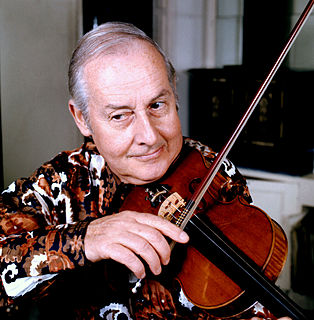A Quote by Stephane Grappelli
Improvisation, it is a mystery. You can write a book about it, but by the end no one still knows what it is. When I improvise and I'm in good form, I'm like somebody half sleeping. I even forget there are people in front of me. Great improvisers are like priests; they are thinking only of their god.
Related Quotes
Human beings are like detectives. They love a mystery. They love going where the mystery pulls them. What we don't like is a mystery that's solved completely. It's a letdown. It always seems less than what we imagined when the mystery was present. The last scene in `Blow Up' is so perfect because you leave the theater still dreaming. Or the end of `Chinatown,' where the guy says `Forget it, Jake, it's Chinatown.' It explains so much but it only gives you a dream of a bigger mystery. Like life. For me, I want to solve certain things but leave some room to dream.
If you want to write about a person who isn't nice, people say, "This is a bad book. It's about somebody I couldn't stand." But that's not the point. You don't have to like a character to like a book. Most of the time, people would misjudge and say, "I didn't like the book." No, you didn't like the character. That doesn't make it any less interesting of a book. In fact, to me, it makes it more interesting.
People are used to streaming and binge-watching. When they see an author they like, if there's only one book, even if they like the book, they're going to forget about you. The way to keep you in their mind and to get you to become a habit for these readers is you have to have a lot of product out there for them to read.
In theatre you can't ad lib, so you want to pick really good material, like David Mamet or Shakespeare or whatever. You want to be really careful about what you do. But in the movies, you do have more wiggle-room. You do have more opportunities to improvise. It's fun to improvise, but I still think it's better to have a great script.
Sometimes people that are very good at improvisation in life, meaning like stage improvisation, aren't good in films because you have to ultimately take a scene where it needs to go. It's not about just saying something that's funny. You can say something funny but if it's not on story or driving the scene to its end it's really not very helpful at all.
That's the one thing that's funny about going from modeling to acting. In modeling, you're supposed to think about what you look like all the time. When you're in front of the camera, if you're not considering that, God knows what the pictures will look like. With acting, you have to completely forget it.



































